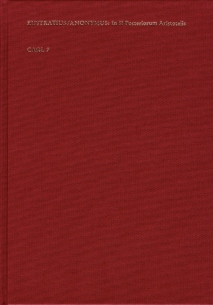Eustratius Nicaenus: Commentaria in II. librum Posteriorum analyticorum Aristotelis. Innominati auctoris: Expositiones in II librum Posteriorum resolutivorum Aristotelis
Facsimile reprint of the Venice edition (1542).
In the 12th century, a remarkable golden age of Aristotelianism originated from a circle of philosophers in Byzantium maintained by the Emperor’s daughter Anna Komnene, who had been excluded from participation in political life. Eustratios of Nicaea and Michael of Ephesus worked together on a commentary on ›Nikomachischen Ethik‹ (Nicomachean Ethics) which was commissioned by Anna. Eustratios wrote the commentary on Books I and VI, Michael of Ephesus on Books V, IX and X. Apart from that, there are several commentaries by Michael on Aristotle’s natural philosophy, whereas here we have a reprint of Eustratios’ commentary on Book II of the ›Analytica posteriora‹. The Latin translation of the commentary on the ›Posteriora‹ (together with a short anonymous explanation of the work) by Andrea Grazioli, a physician, ushered in a new era in the interpretation of the Aristotelian theory of science.
Reviews
»La collection met à la portée des historiens de la philosophie, dans une édition luxueuse, ces traductions latines de la Renaissance qui marquent une étape importante dans la culture humaniste et dont les exemplaires primitifs sont rares et difficilement accessibles.«
»Insgesamt lässt sich sagen, dass mit diesem Band wieder ein wertvoller Kommentar zum aristotelischen Organon in einem qualitativ exzellenten und sehr gut lesbaren Nachdruck in lateinischer Übersetzung vorliegt. Die ansprechende und hervorragend informierende Einleitung erschließt knapp und doch umfassend den kulturellen Kontext seiner Entstehung. Für das Studium der Rezeptionsgeschichte des aristotelischen Organon in der frühen Neuzeit und der damit einhergehenden philosophischen Begriffsbildung im Lateinischen und, davon ausgehend, den westlichen Nationalsprachen ist diese Übersetzung unverzichtbar.«
All volumes
- Alexander von Aphrodisias: Commentaria in duodecim Aristotelis libros de prima philosophia – available
- Alexander von Aphrodisias: In libros meteorologicorum – available
- Dexippus: In defensionem praedicamentorum Aristotelis adversus Plotinum – available
- Alexander von Aphrodisias: Enarratio de anima ex Aristotelis institutione – available
- Ammonius Hermeae: Commentaria in Peri hermeneias Aristotelis – available
- Eustratius / Aspasius / Michael Ephesius et al.: Aristotelis Stagiritae Moralia Nicomachia – available
- Johannes Philoponus: Commentaria in libros De generatione et corruptione Aristotelis – available
- Ammonius Hermeae: Commentaria in quinque voces Porphyrii; In Aristotelis categorias (erweiterte Nachschrift des Johannes Philoponus= CAG XIII i) – available
- Simplicius: Commentaria in decem Categorias Aristotelis – available
- Eustratius Nicaenus: Commentaria in II. librum Posteriorum analyticorum Aristotelis. Innominati auctoris: Expositiones in II librum Posteriorum resolutivorum Aristotelis – available
- Alexander von Aphrodisias: In VIII Libros Topicorum Aristotelis Commentatio. Pseudo-Alexander: Annotationes in Librum Elenchorum Aristotelis – available
- Johannes Philoponus: Commentaria in Libros Posteriorum Aristotelis – available
- Johannes Philoponus: Commentariae Annotationes In Libros Priorum Resolutivorum Aristotelis – available
- Theodorus Metochites: Paraphrasis in Aristotelis universam naturalem philosophiam – available
- Pseudo-Johannes Philoponus: Expositiones In Omnes XIV Aristotelis libros Metaphysicos – available
- Michael Psellus: Commentarii in Physicen Aristotelis – available
- Subject Areas
- New Publications
- ---
- Critical Editions
- Collected Works
- Series
- Arbeiten und Editionen zur Mittleren Deutschen Literatur
- Aufklärung und Revolution
- Böhme-Forschungen
- Bibliothek 1800
- Clavis Pansophiae
- Collegium Philosophicum
- Commentaria in Aristotelem Graeca
- Doctrina et Pietas
- Editionen zur Frühen Neuzeit
- Elea
- Europäische Literatur der Frühen Neuzeit
- exempla aesthetica
- Forschungen und Materialien zur Universitätsgeschichte
- Forschungen und Materialien zur deutschen Aufklärung
- Freidenker der europäischen Aufklärung
- Freud heute
- frommann-holzboog Studientexte
- Fundamenta Historica
- Grammatica Speculativa
- Grammatica Universalis
- Kultur und Gesellschaft
- legenda
- Judith Le Soldat heute
- Medizin und Philosophie
- Melanchthon-Schriften der Stadt Bretten
- Mystik in Geschichte und Gegenwart
- Natur und Philosophie
- Neuzeit im Aufbau
- Philosophie interkulturell
- Philosophische Clandestina der deutschen Aufklärung
- Der Platonismus in der Antike
- Politische Philosophie und Rechtstheorie des Mittelalters und der Neuzeit
- problemata
- Psychoanalysis International
- Quaestiones
- Schellingiana
- Specula
- Spekulation und Erfahrung
- Supplementum Platonicum
- Volksaufklärung
- Werkstatt Bionik und Evolutionstechnik
- Bibliographies and Reference Books
- Allgemeine Zeitschrift für Philosophie
- AZP Beihefte
- Jahrbuch der Psychoanalyse
- JP Beihefte
- Steiner Studies
- Open-Access
- Single volumes
- eBooks
- Special Offers
- ---
- Authors
- Publishing house
- Links / Partner
- Paths to Philosophy
